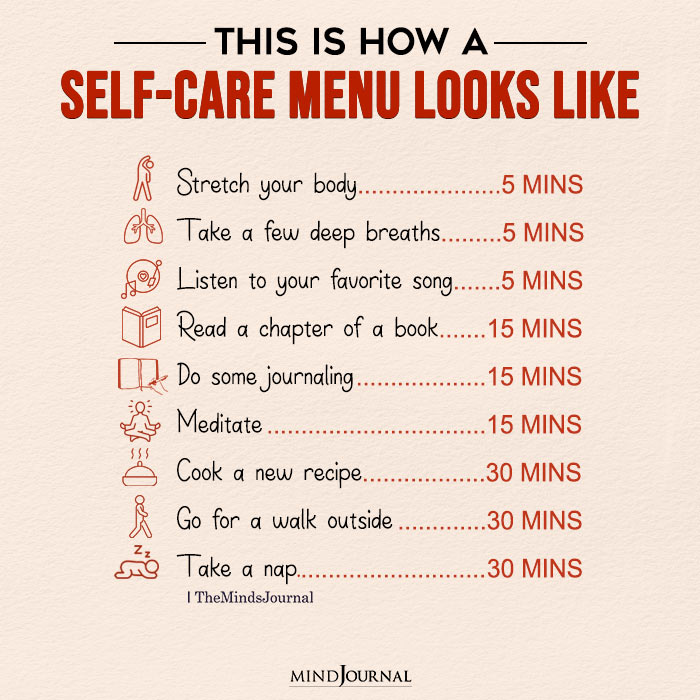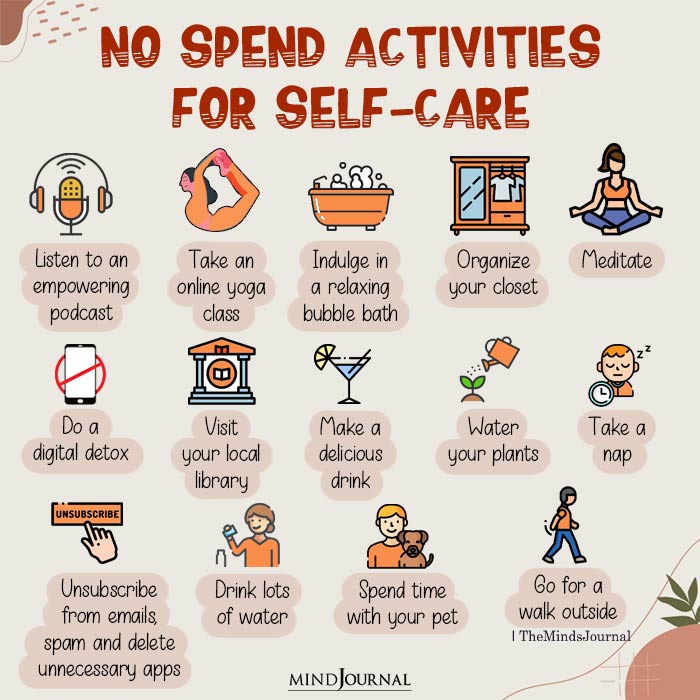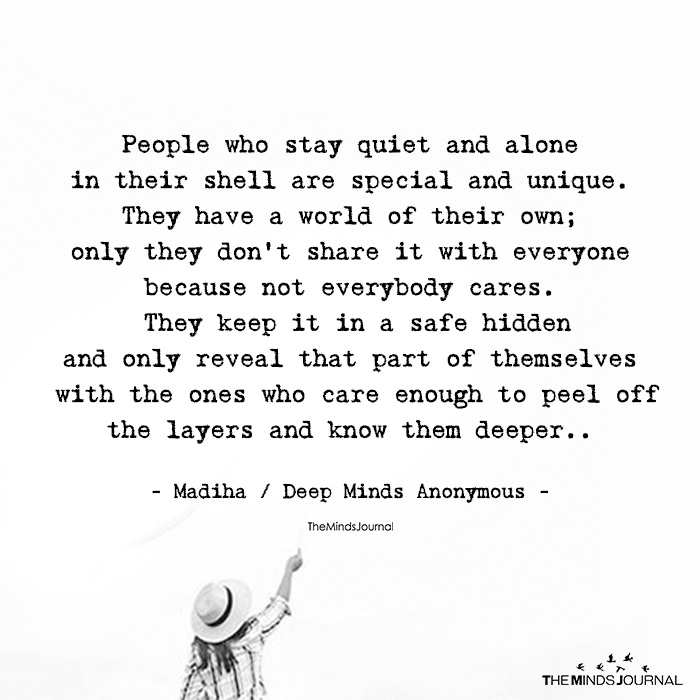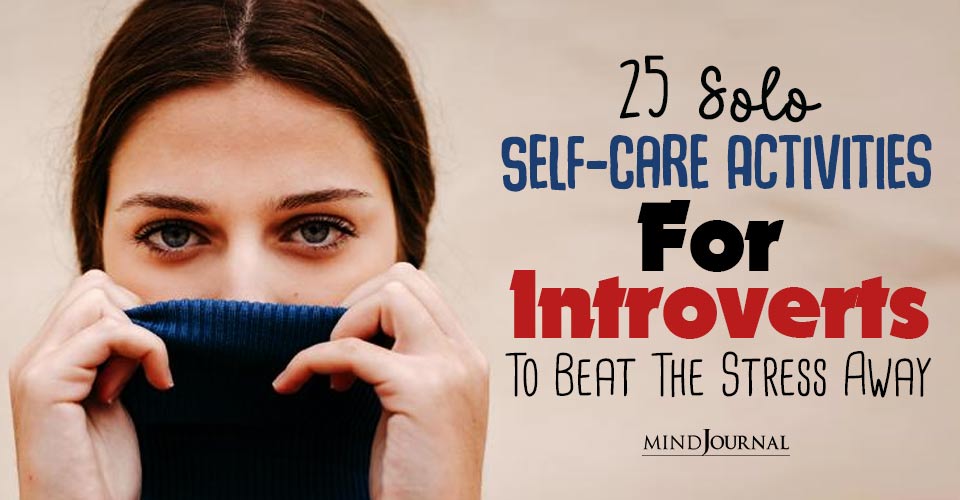Are you an introvert? Our tips on self-help for introverts will help you not only to survive but also to thrive in overly stimulating environments!
Are You An Introvert?
An introvert is an individual with a unique personality type that makes them prefer solitude and quiet environments.
“Introvert people”, as the world likes to call them, prioritize introspection or internal stimulation over social interactions or external stimulations.
- Introverts tend to feel depleted, exhausted, and overwhelmed by social interactions and find social situations, such as parties or gatherings to be too stimulating for their comfort.
- After such a draining experience, they need some alone time to recharge themselves.
- They tend to ruminate on the behavior of others as well as themselves, hence they require enough space and time to reflect in solitude.
- They often appear reserved in social situations and visibly uncomfortable in large groups and especially in unfamiliar social settings.
- They’re often misunderstood as rude, shy, or someone who lacks confidence and social or interpersonal skills.

Why Introvert Self-Care Is Important?
Self-care is about taking the time to nurture your body, mind, and spirit. As an introvert, it’s important to honor your need for alone time and engage in solo activities that nourish your well-being.
Read What Happens When Introverts Don’t Get Alone Time?
Introverted or not, it’s not possible to avoid social interactions altogether in today’s time. But being an introvert in a society that values extroverted qualities can be quite challenging.
So, unless you have a private island all to yourself, as an introvert, you need to take care of your mental and emotional well-being, lest you could get anxious or burn out.
With our strategical self care for introverts, you can easily navigate the world around you and even thrive in social situations that may seem daunting.
Obviously, everyone needs to create a self-care regimen, but, self care for introverts needs to be curated keeping in mind their unique challenges and preferences.

Introverts tend to enjoy their company, cherish their handful but close friends, recharge in solitude, and thrive in quiet environments, while extroverts draw energy from social interactions and crave stimulation.
Naturally, self-help for introverts will be different. Let’s take a look!
Self-Help for Introverts: Nurturing, Healing, and Preserving Your Energy!
Here are 25 solo self-care ideas for introverts:
1. Journaling
Writing is an effective way to put your overwhelming emotions and confusing thoughts in order. Keep a journal and write in it about your daily experiences, struggles, hopes, and dreams.
When it comes to self-care for introverts, journaling can help you calm down, process your feelings, uncover insight into your thoughts, and gain clarity.
2. Reading
Next on our agenda of introvert self care, comes reading. Reading gives you a chance to ditch your reality and escape into the world of fantasy, all from the comfort of your bed or couch.
Curling up with a book you enjoy can be a great introvert self-care activity that you can enjoy on your own.
Pro tip:
- Choose a book that matches your interests.
- It doesn’t have to be the one that “everyone else is reading”.
3. Meditation or Yoga
Regularly practicing Yoga or meditation can do wonders for your physical and mental health.
You’ll find yourself more focused, patient, and agile at adapting to various situations, both external and internal.
Pro tip:
- Set time aside to engage in these activities.
- Find a quiet space where no one will disturb you.
- If you are new to these practices, try guided meditation and yoga videos or use an app.
4. Creative Expression
Hey, all introvert people out there, tap into your inner creativity and bring your inner child out to play. Back when you were a child, how did you love to spend your time? Not playing with other children I presume!
Then what gave you joy and pleasure? Drawing, coloring, making sand castles, or writing? Make it a part of your introvert self-care routine as an adult!
Engaging in a creative activity can be cathartic and liberating. Don’t worry whether you’re good at it or not; your younger self didn’t!
Just do it for your own enjoyment. The experience of creating something can be just as fulfilling as the outcome.
5. Spend Time In Nature
Nature can have a healing, calming, and grounding influence on introverts. Whenever you feel stressed or triggered, see how being in nature feels soothing for you.
- Try gardening
- Keep indoor plants
- Go somewhere you can watch the sky or birds
- Take a hike!
- Watch sunsets
- Go to a park and just take in all the surroundings

6. Have a Spa Day at Home
Going to a spa or letting a stranger touch you can be a big “no-no” for introverts.
But that doesn’t mean they cannot enjoy the luxurious and relaxing experience of self-care in the privacy of their home.
- Immerse in a bubble bath
- Use essential oils or bath salts
- Light some scented candles
- Put on a face pack
- Massage yourself with a foam roller or massage ball to release tension in your muscles
Pampering yourself can be very rejuvenating and it also reduces your stress levels.
7. Cooking or Baking
Cooking or baking can be a relaxing activity if you enjoy doing them. You can experiment with new recipes or make your favorite comfort foods.
8. Decluttering
Decluttering your wardrobe or other belongings can be a productive way to spend your “me time”. Don’t see it as a chore, but rather as an activity that will make your living space look better and give you a sense of control over your surroundings.
9. Mindful Movement
In addition to yoga, other mindful movement practices such as Tai Chi, Qigong, simple stretching, cycling, or other exercises can also be beneficial for introverts.
These healthcare practices combine mindful movements with breathing exercises and can be a powerful way to activate your energy.

10. Digital Detox
As an introvert, you might not enjoy always being available to answer calls or texts. Some even find it nerve-wracking when they have to respond to an email or message within a short period.
Unfortunately, the modern world doesn’t give all of us the luxury to go off the grid or to not take or return calls, especially the ones from our bosses or colleagues.
But what you can do is take a break from your smartphone, laptops, etc. and pull the plug once you’re off work.
Taking a break from technology and also social media can have a positive impact on your emotional well-being. It will help you reduce your stress and boost your inner peace.
Do it for a few hours or for a whole day, and utilize this time by doing other self-care activities such as reading or spending time in nature.
11. Self-Reflection
Ask yourself questions such as
- “What are my values and goals?”
- “What brings me joy and fulfillment?”
- “Why is this bothering me?”
- “What lesson can this experience teach me?”
Then reflect on the answers that your inner self gives to you. This practice can be very helpful when your external environment is threatening your inner balance or making you question yourself.
12. Set Boundaries
Setting healthy and firm boundaries is an essential part of self-care for introverts. This can mean saying no to social obligations you do not wish to fulfill or telling someone that they need to check with you through a text before calling you.
By creating boundaries around your availability and preferences, you defend your choices and assert yourself. You basically let others know how you wish to be treated.
13. DIY Projects
Engage in a home improvement project or engage in activities like knitting, woodworking, or sewing. You can also do puzzles, sudoku, or scrabbles. These hobbies stimulate your mind and offer you a sense of satisfaction.
14. Podcasts or Audiobooks
If you enjoy listening to stories, try out podcasts or audiobooks. Choose a topic that interests you or listen to a novel that you have been wanting to read.
Pro tip: Create a playlist to listen to while you’re stuck on a long trip with your annoying cousins.
15. Adult Coloring Books
Coloring can be a relaxing experience and important self-help for introverts. Adult coloring books often feature intricate designs that can be both challenging and soothing.
Read: How Mandalas Can Help Reduce Stress and Anxiety
16. Aromatherapy
Use essential oils or scented candles to create a calming and relaxing environment in your home. Scents like lavender, chamomile, and peppermint can be especially soothing.
17. Music
Listening to your favorite music can be a powerful way to reduce stress and cultivate happiness. Create a playlist of your favorite relaxing songs, put on your headphones, and drown out the world.
Read: 7 Ways Noise Sensitive Empaths Can Cope With Toxic Noise
18. Date Yourself
Treat yourself to a movie night at home. Binge-watch your favorite sitcom while munching snacks or sipping margaritas.
Take yourself out on lunch. Shop for things that you have always wanted for yourself. Go to the movies all by yourself.
Doing all these will be empowering for your soul and help you enjoy your company even more.
19. Create a Peaceful Living Space
Creating a serene living space is a crucial self-help for introverts that allows them to recharge and relax. This can mean:
- Setting up a cozy reading nook
- Surrounding yourself with calming scents and soft lighting
- Decorating your home with pretty figurines, paintings, or photos of loved ones
- Putting up a beautiful vase with flowers on your mantel
Create a sanctuary at your home or where you work, even if it’s a tiny cubicle. But it must reflect your personal style and preferences. It will offer a feeling of belonging, be a safe haven for you, and will nourish your soul.
20. Reach Out To A Fellow Introvert
There are more introverts out there than you think. Join a support group or find communities of fellow introverts online. Reach out and talk to other introverts. Vent, if that helps.
Just be safe out there while communicating with a stranger either online or offline. And always be respectful of others’ boundaries and trigger points.
21. Go For a Solo Drive or a Long Walk
Just going out on a long walk or a drive can help you to clear out your head and put things into perspective.
22. Power Nap
Make nap time a part of your self-care routine. Have your forty winks when things start getting way too stressful. And you will wake up feeling recharged and refreshed.
23. Spend Time With A Pet
Cuddling a furry friend or tending to a pet fish can be excellent self-help for introverts. Caring for pets has tremendous benefits for mental health.
It reduces stress and makes you warm from the inside. Also, you can have the love and affection of a living being without the chitchat!
Read: 8 Reasons Why Introverts Connect Deeply With Their Pets
24. Live In The Moment
Whatever self-care strategy you adopt, make sure to be mindful enough to enjoy that experience.
- While eating, notice the aroma, texture, and flavor.
- While out in nature, listen to the birds and smell the freshly cut grass.
- While taking a bath, enjoy the relaxing sensation you feel.
The best self-help for introverts is being present and savoring each morsel of life!
25. Take A Break!
Because you need to unpack all those emotions, recharge your batteries, and reignite your spark.
So, go on a solo trip or a weekend getaway. Visit that country fair. Or Spend a whole day in your jammies and eat cookie dough for breakfast! Do whatever brings you relaxation and joy!
Final Thoughts

Our popular culture has made us believe that the world is only made for people who love to grab the limelight. Whereas, it’s our uniqueness that makes the world so interesting.
While some effortlessly mingle with others, some need their space more often. It’s unfair to judge introverts for their natural tendencies. They have their own way of processing information and interacting with the world around them.
Self-care is not a luxury, but a necessity to maintain your physical, emotional, and mental well-being, and it is especially true for introverts. Practicing self-care is essential for them to recharge and get back their inner balance.
By making self-care a priority, introverts can improve their well-being and thrive in a world that may not always understand their needs.
A message to all introvert people: Self-care is not one-size-fits-all. What works for one person may not work for another. The key is to find activities that resonate with your personal preferences and values and bring you inner peace, joy, and fulfillment.
However, self-care is an ongoing practice and not something that can be done once and forgotten about; so make self-care a regular part of your routine. You might want to experiment with different activities and find what works best for you.
Try incorporating these solo self-care tips into your routine and see how they positively impact your life.











Leave a Reply